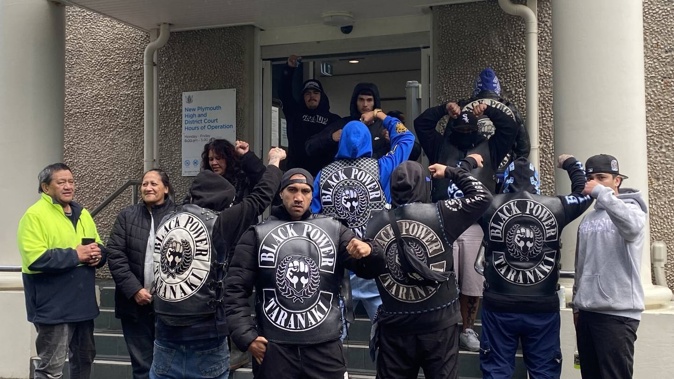

A middle-aged man with a mental illness took his daily walk to McDonald’s where the staff knew to expect him and which combo he would order. But while waiting for his meal inside the family restaurant, he was stabbed and brutally beaten, all because of the red jersey he was wearing.
Up to 13 Black Power members and associates took part in the attack at the Hāwera McDonald’s in South Taranaki on September 12 last year, as staff and diners watched on in horror.
While some of the men remain unidentified, eight were arrested and charged for the sustained beating and on Friday, seven were sentenced in New Plymouth District Court.
The sentencings drew a heavy gang presence to the courthouse, as well as police, and due to the number of offenders, the hearings took place over three sittings throughout the day.
Each hearing saw the public gallery at capacity with supporters, who threw up their clenched fists and yelled the gang’s slogan “yoza” in tribute to their comrades as they were taken away by Corrections staff to begin their sentences.
Judge Tony Greig opened each hearing by offering a chance for karakia, which was taken up by one matua at the second sitting, who spoke from the gallery.
The judge then advised that he and the court would treat the offenders and their supporters with respect and he expected the same in return.
As each man was sentenced, reports of childhood deprivation and trauma, intergenerational gang ties and loyalty to the brotherhood were heard, as were the full-time jobs the men held down, the whānau they were devoted to and the remorse they felt for what the judge described as “mindless violence”.
The level of involvement in the attack varied between the men, and some were jailed while the rest were given home detention. What was mostly consistent were the bumper discounts applied to the sentences.
Seeing red
The court heard that around 3.55pm on the day of the attack, the victim was walking along South Rd in Hāwera while wearing a red jersey. Red is the colour worn by Black Power’s rival gang, the Mongrel Mob.
As he crossed the road, two men drove past. The passenger in the vehicle yelled at the victim and raised a clenched fist, Black Power’s salute.
/cloudfront-ap-southeast-2.images.arcpublishing.com/nzme/M5NMIXEITNDCFIQ56AWRZ7LZXA.jpg) The sentencings took place at New Plymouth District Court on Friday. Photo / Tara Shaskey
The sentencings took place at New Plymouth District Court on Friday. Photo / Tara Shaskey
The car pulled over and the passenger continued to yell at the man, but he was unable to hear what was being said.
He continued his walk to McDonald’s and once he arrived he ordered a meal and waited inside the restaurant for it to be prepared.
As he sat, Chozen Moka-Wanahi, Gabriel James Hansen, Tamati Karaitiana and Whetu Marley Rupapera-McRoberts arrived in a vehicle.
A short time later, a second car arrived containing an unknown male.
CCTV captured the men, a number of whom were wearing patches, leaving their vehicles and entering the restaurant. They ignored the service counter and headed straight for the victim.
The group began to accost the man and a further five associates and patched members of the gang arrived.
An unknown man wearing a balaclava hit the man with a weapon, thought to be a hammer or a tyre iron, across the face, causing him to fall to the ground.
Hohepa Rio, Hansen, Karaitiana, Rupapera-McRoberts and an unknown man then united in an attack against the victim.
Karaitiana, 22, kicked him twice, Hansen, 25, jumped over chairs and lunged at him, punching his head four times, before the unknown man struck his head a further three times.
Rio, 35, stepped in and hit the victim twice. Moka-Wanahi, 19, did the same and then threw him to the floor and delivered a kick to his torso.
While the man was on the ground, Rupapera-McRoberts, 19, threw two punches at him.
Around that time, Timothy William Dixon, 54, and Stacey Taurima, 48, walked into the restaurant. Dixon approached the victim from behind, leaned over him and then turned and walked away.
The assault came to an end and the other men fled the restaurant.
The man was helped by McDonald’s staff and soon after he returned home he discovered he had been stabbed in the torso during the attack. It is still not known who stabbed him.
A life significantly altered
In court, his victim impact statement was read on his behalf.
He said he was 40 years old, lived with his parents and suffered from a mental illness for which he took medication daily.
The man said he has never associated with a gang, minded his own business and did not cause problems for anyone.
“I simply keep to myself.”
He said he was a regular at McDonald’s in Hāwera and was well-known by the staff.
“This was an unprovoked attack in a place I went every day and felt safe.
/cloudfront-ap-southeast-2.images.arcpublishing.com/nzme/KZTQHY2OJNDKJKVXFZ4Q5FK7EY.jpg) The attack occurred at Hāwera McDonald's, to which the victim walked every day for a meal.
The attack occurred at Hāwera McDonald's, to which the victim walked every day for a meal.
“I did not do anything to the gang members that attacked me that would justify their brutal actions. I simply wore a red sweatshirt.”
The man said he pleaded with the men during the violent incident, telling them he was not connected to the Mongrel Mob.
He was terrified as it unfolded and said he remained afraid to this day.
“I’ve been too frightened at times to leave my house. My life was altered significantly.
“The attack shook my world.”
‘The downside of gang culture’
In sentencing the men, Judge Greig said the case was a prime example of mindless violence.
“This was an unwell man whose only offence was wearing a red top,” he said.
“He thought your shouts and gang slogans were friendly greetings and so he gave you a friendly wave back.”
In return, the judge said the man was smashed across the face, punched, kicked and stabbed.
He said the gangsters’ response to the victim wearing red was a code of behaviour used to “protect their patch”.
“And you all now realise that this was a really bad mistake and that he is, in fact, whānau to some of you.”
All of the men were sentenced on an admitted charge of participating in an organised criminal group and all, except for Taurima, on a count of wounding with intent to injure.
He said the aggravating factors included a degree of premeditation, the extent of harm caused to the victim, his vulnerability, the violence used, that it was a group and gang attack, it was unprovoked and occurred in a public setting.
Taurima, a “proud” member of the gang whose offending has waned in his later years, was the least involved.
Judge Greig gave him credit for his guilty plea, time spent on bail, remorse and background factors.
From a start point of three years’ jail, he was sentenced to 21 months which was then converted to 10 months of home detention.
Rupapera-McRoberts had no previous convictions and was considered a low risk of reoffending.
He had a reduced role in the attack and admitted he was “just trying to be cool and follow the rest of the group” but now realised it was a “stupid decision”.
The judge accepted gang culture for Rupapera-McRoberts provided “something positive in his life, something otherwise missing”.
“But wanting to inflict serious injuries upon someone because they’re wearing the colour red is the downside of gang culture,” he said.
From a start point of four years and six months’ jail, Rupapera-McRoberts was given credit for his guilty pleas, youth and lack of previous convictions, remorse, background factors and time spent on electronically monitored bail.
An end sentence of 22 months’ imprisonment was converted to 11 months of home detention.
Karaitiana, described as shy and well-mannered, had no previous convictions and was a hard worker.
Born into the gang, he experienced hardship as a youngster but ultimately grew up in a loving home.
While he was not a patched member of Black Power, he was loyal to his whānau - the gang.
He was stoned at the time of the attack, grieving the loss of a parent and just “went with it” when he was picked up by the gang members heading to McDonald’s. He said he immediately regretted it.
From a start point of five years in jail, Karaitiana was given credit for guilty pleas, background factors, remorse, youth, rehabilitation prospects, having no previous convictions and for being on restricted bail.
The end sentence of 23 months’ imprisonment was converted to 12 months of home detention.
Dixon, who has consistently offended since 1982, had the propensity to be violent and a high risk of harm and reoffending.
While the “hard-working provider” showed some remorse and insight in relation to the attack, his “true level of loyalty” was to the gang, the judge said.
Following discounts for guilty pleas, time spent on electronically monitored bail and remorse, Dixon was jailed for three years and three months.
The McDonald’s beating was “a real escalation” in offending for Rio, who joined the gang in 2007 and had a short criminal history, Judge Greig said.
While the court heard his involvement was seemingly fuelled by his co-offenders’ behaviour, he had taken full responsibility for his part.
But the judge did not agree his role was limited, as suggested.
“You took your turn in the lineup to give this man a hiding.”
From a start point of five years’ imprisonment, he was given credit for guilty pleas and remorse before being jailed for three years and three months.
Last to go before the judge were Moka-Wanahi and Hansen, who were sent to prison for three years, and three years and three months respectively following discounts from a start point of five years.
Moka-Wanahi was the youngest of the group charged with the attack but had some of the most serious previous convictions. He was serving a sentence for an earlier incident of a similar nature at the time.
His upbringing was marred by adversity and he now lacked insight and empathy, had anger issues and was considered a high risk of causing harm to others.
Jail was the only option, Judge Greig said.
“I’m certain if I was to release you today or at any time in the near future I would simply be allowing you another opportunity to inflict serious harm on another inoffensive, defenceless human being.”
Hansen, a father, a “good worker” and a prospect for the gang, did not have a serious criminal history and said he felt he had no choice but to take part in the attack.
He had hoped for home detention but the judge was not swayed.
“You’re not the first of your co-offenders where I feel sending you to prison is a sad exercise. And I really do regret having to do this.
“This would never have happened if you weren’t in a gang. You put yourself in a gang and that led you directly to carrying out a pack attack on this defenceless man.”
The proceedings were closed with a karakia.
An eighth man has been charged with wounding with intent to injure, participating in an organised criminal group and unlawfully carrying a firearm in relation to the incident. He is yet to plead and will appear in court on July 13.
-Tara Shaskey, Open Justice
Tara Shaskey joined NZME in 2022 as a news director and Open Justice reporter. She has been a reporter since 2014 and previously worked at Stuff where she covered crime and justice, arts and entertainment, and Māori issues.

Take your Radio, Podcasts and Music with you









